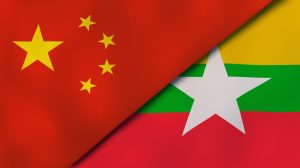By Sebastian Strangio

On Saturday, China’s ambassador to Myanmar held his first official meeting with Myanmar junta leader Sen. Gen. Min Aung Hlaing, marking an important watershed in Beijing’s recognition of the government that seized control in February.
As per a characteristically bland and sunny Chinese Embassy statement, Min Aung Hlaing told Ambassador Chen Hai that his government is “committed to promoting national stability, economic growth and improvement of people’s livelihoods, and safeguarding democracy and rule of law.” He said that his government “sees China as an important neighbor and is willing to maintain communications with China.”
For his own part, Chen “stressed that the Chinese side has always cherished and attached great importance to the traditional friendship with Myanmar” and “sincerely hopes for the earlier restoration of peace and stability in Myanmar.” The envoy added that China supported the implementation of the five-point consensus formulated by the Association of Southeast Asian Nations (ASEAN) at its special meeting in April, and said Beijing would “continue to play a constructive role in this regard.”
So far, so anodyne. Indeed, the most important thing about the meeting may have been the fact that the embassy’s reporting of the proceeding marked the first time that the Chinese government has referred to the general as “the leader of Myanmar.”
As the journalist Pei-Hua Yu observed yesterday, this marks the latest in a stepwise evolution toward (possibly grudging) Chinese acceptance of the new junta.
Immediately following the February 1 coup, Yu pointed out, Chinese media referred to Min Aung Hlaing by his military title, Commander-in-Chief of the Tatmadaw. This changed after ASEAN held its special Leaders Meeting in Jakarta on April 24, when Chinese media and officials began referring to Min Aung Hlaing as chairman of the State Administration Council, the formal name for the junta. According to Yu, this latest formulation followed the visit of a special ASEAN delegation to Naypyidaw on Friday and Saturday.
This suggests that China has accepted, at least for now, that the junta will remain in power for the foreseeable future, and that it needs to accommodate itself to the new reality in order to safeguard and advance its key strategic interests in the country. It also implies that Beijing is taking its diplomatic cues from ASEAN’s engagement with the military junta, or at least using ASEAN’s moves to justify its own actions.
China’s accommodation to the new reality in Myanmar is also reflected by Beijing’s extension of an invitation for the junta’s Foreign Minister Wunna Maung Lwin to the Special ASEAN-China Foreign Ministers’ Meeting that it is hosting in Chongqing this week.
As I’ve argued before, China had reasons to be frustrated by the military’s seizure of power. At a stroke, Min Aung Hlaing and his cronies wiped out years of diplomatic investment in State Counselor Aung San Suu Kyi and the ousted National League for Democracy (NLD) government, and brought to power an institution with an ingrained suspicion of China and its intentions. It also brought to a halt years of gradual progress on cherished infrastructure projects designed to link China’s southwest provinces with Myanmar’s coast.
While China’s move will be widely viewed as legitimizing the junta, and condemned rightly as such, it was always likely to happen sooner or later as long as the junta remained in effective control of the state and its coercive power. Indeed, as a neighboring country with considerable economic and strategic interests in Myanmar, and a proclaimed policy of “non-interference,” it is hard to imagine China remaining indefinitely on the fence.
At the same time, dealing more openly with the junta is unlikely to do much to burnish China’s image in Myanmar, where opponents of the military view its diplomatic prevarication as a gross violation of the people’s will and a form of interference in Myanmar’s “internal affairs.” Trapped between dealing with a prickly junta and the widespread loathing of a large proportion of the country’s people, China faces a rocky future in Myanmar.
No comments:
Post a Comment